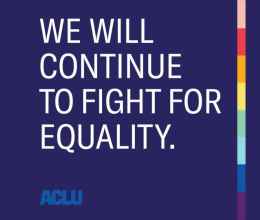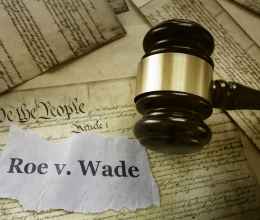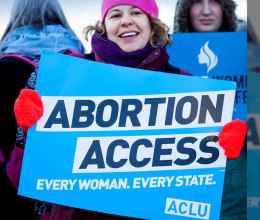The Alaska Supreme Court struck down a state law requring parental notification before minor women can obtain abortions, citing the law's violation of both the equal protection guarantee as well as privacy rights. After this law was passed in 2010, we joined Planned Parenthood Federation of America and the Center for Reproductive Rights in representing Planned Parenthood of the Great Northwest and other abortion services providers targeted by the law.
The ACLU of Alaska believes young women who are pregnant need safe and confidential medical care, not laws that make it harder to get support from trusted adults, and we hope today's ruling will go a long way in ensuring Alaskan women's safety as they make important decisions about their lives. Read a blog post from our executive director, Joshua A. Decker, here.
Alaska Supreme Court Overturns Parental Notice Law for Teenagers Seeking Abortion
For Immediate Release: July 22, 2016
Contact: Joshua A. Decker, 907.263.2002, [email protected]
Anchorage, Alaska – The Alaska Supreme Court today found unconstitutional a law requiring physicians to notify a parent, guardian, or custodian of a minor seeking an abortion. Today’s decision comes less than a month after the U.S. Supreme Court issued its historic ruling in Whole Woman’s Health v Hellerstedt — the most significant abortion-related ruling from the Court in more than two decades.
The Alaska Supreme Court struck down the requirement, finding that there was no basis on which to distinguish between minors seeking abortion and minors carrying to term – burdening only minors seeking abortion therefore violates the equal protection guarantees of the Alaska Constitution.
“A young woman seeking an abortion doesn’t need additional hurdles. She needs a doctor,” said Joshua A. Decker, executive director of the American Civil Liberties Union of Alaska. “We have a responsibility to keep our daughters safe, and this law doesn’t do that. Healthy families don’t need government mandates to communicate. Instead, young women from families in crisis and young women in fear need safe, prompt, confidential health care, free of government-imposed restrictions.”
The evidence in Alaska shows that most young women seeking an abortion involve a parent. But some young women live in an abusive home, or a home where it would not be safe to disclose a pregnancy. The law would have required a young woman to go through a complicated legal process to persuade a judge to allow her to have an abortion without parental involvement — forcing abortions later in pregnancy, if the young woman could access the procedure at all.
"Today’s decision provides important protection to the safety and well-being of young women who need to end a pregnancy," said Janet Crepps, senior counsel at the Center for Reproductive Rights. "The reality is that some young women face desperate circumstances and potentially violent consequences if they are forced to bring their parents into their reproductive health decisions. This law would have deprived these vulnerable women of their constitutional rights and put them at risk of serious harm.”
Mandatory parental involvement laws like Alaska’s are opposed by state and national medical experts, including the American Academy of Pediatrics because they do not foster healthy communication, and in fact can be very detrimental to the health and safety of young women. In fact, the American Medical Association, the American College of Obstetricians and Gynecologists, and the Society for Adolescent Medicine have all advocated for the need to protect minor’s access to confidential reproductive health services.
“We applaud the court for ruling to protect the health and safety of young women in Alaska,” said Christine Charbonneau, president and CEO of Planned Parenthood of the Great Northwest and the Hawaiian Islands. “We all want teens to be safe — and the sad truth is that some teens live in dangerous homes and can’t go to their parents. This law would prevent some of Alaska’s most vulnerable teens from accessing safe medical care.”
The plaintiffs in this challenge — Planned Parenthood of the Great Northwest and the Hawaiian Islands, Dr. Susan Lemagie and Dr. Jan Whitefield — are represented by a team that includes attorneys from the ACLU, the Center for Reproductive Rights and Planned Parenthood. An Alaska state court judge initially upheld part of the law and eventually allowed the notification requirement to go into effect while striking down other provisions.
This release is at: www.aclu.org/news/alaska-supreme-court-overturns-parental-notice-law-teenagers-seeking-abortion
# # #
Learn more about the case at www.aclu.org/cases/planned-parenthood-great-northwest-et-al-v-state-alaska





